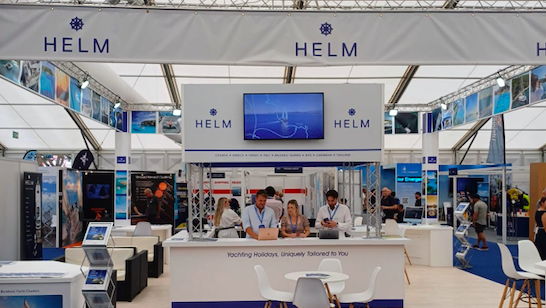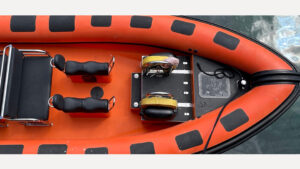Helm lifts the lid on an ‘explosive’ few years

“Peer-to-peer boating is simply not a scalable business model, nor is the ‘marketplace’ approach, unless fully automated, removing the human interaction and expertise from the transaction, and placing the full weight of research upon the customer’s shoulders,” says Simon Morgan co-founder of luxury charter company Helm.
Morgan, along with co-founder Peter Harrison-Hill, has been ‘lifting the lid’ on what Helm’s terming its explosive few years, which he hopes are now firmly in the past. And, while Morgan notes that the whole industry has been tumultuous, it’s been especially challenging for the travel sector — and for those selling and buying back their business less than two years later.
That’s what he did. Helm was sold to Borrow A Boat in June 2021 and, in a bid to save clients’ charters, employees’ jobs and long-standing relationships with fleet operators, bought back in April 2023, after Borrow A Boat fell into administration.
In June 2021, the team was approached by Borrow A Boat, with what Morgan calls an attractive business proposition. The decision was made to sell the business. The core team remained in place to help drive the brand and the wider business forward to greater growth and give Helm stability during a turbulent macroeconomic climate.

However, says Morgan, it became apparent that there were cracks. He says Borrow A Boat was saddled with major debts owed to a number of creditors, and while Helm continued to grow, delivering 700 charters in 2022, the same was not true of the parent company.
After some difficult months spent trying to rescue Borrow A Boat, Morgan and Harrison-Hill bought Helm back in a fully solvent deal and regained direct control.
“It’s been a choppy few years of peaks and troughs, and we have had to streamline the business, regain our balance, and refocus. We are very positive for the future and the world of charter,” he says.
“Covid was a particularly bruising time for the travel industry, claiming many business scalps, but it also created immense opportunity, and a sort of demand bottleneck that made 2021 and 2022 record years for yacht charter, as travellers returned after two years cooped up at home, with a renewed vigour and desire to explore. Many people were able to reassess their priorities, valuing fewer, higher quality trips to create really memorable experiences. It also taught us a lot about the companies, yachts and crews we work with and reinforced our commitment to being incredibly picky.”
Helm has booked more than 1,000 charters already in 2023. That said, Morgan notes that 2023 has seen higher availability than usual as demand stabilised to a high but manageable level.
Morgan adds: “We’ve seen a sharp upgrade in specifications and a decrease in the average age of charter fleets since 2020, as the industry adjusts to customers increasingly choosing younger and better-equipped boats. Crews and base teams are getting better training as operators realise that one bad review can derail their reputation, and we’re seeing improved standards as a direct result, which is great. Fleet operators are waking up to the fact that if they deliver a seamless, exceptional experience, we will give them more bookings.”
Morgan believes that the rise of catamarans in the charter space over the last five years is definitely here to stay.
“Catamarans represent exceptional value and are very guest-friendly — with minimal heel angles and oodles of space, they sit in a sweet spot between sailing yachts and motorboats, combining the best bits of both. All of these factors make catamarans an excellent way to introduce people to the concept of a yachting holiday, even those who have never considered it as an option.”












I’m sure it’s wonderful but I didn’t understand a word of the first part of the article. I nearly gave up but thought I needed to stick with it. It would have been so much better if it had been written in normal English.